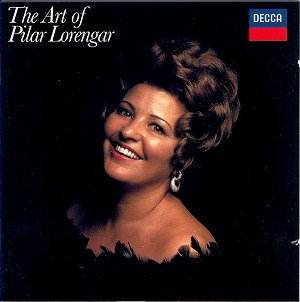



The Art of Pilar Lorengar
CD 1
Giacomo PUCCINI (1858-1924)
La Bohème: Sì, mi chiamano Mimì (1), La rondine:
Chi il bel sogno di Doretta (1), Madama Butterfly: Un bel dì
(1), Tu, tu, piccolo Iddio (2), Turandot: Tu che di gel
sei cinta (1), Gianni Schicchi: O mio babbino caro (1), Suor
Angelica: Senza mamma (2), Tosca: Vissi d’arte (2)
Antonín DVOŘÁK
(1841-1904)
Rusalka: Mĕsíčku na nebi hlubokém
(2)
Wolfgang Amadeus MOZART (1756-1791)
Le nozze di Figaro: E Susanna non vien! … Dove sono I bei momenti (3),
Die Zauberflöte: Ach, ich fühl’s (4), Così fan
tutte: Come scoglio (5)
Gustav CHARPENTIER (1860-1956)
Louise: Depuis le jour (1)
Georges BIZET (1838-1875)
Carmen: C’est des contrebandiers … Je dis que rien (1)
Richard STRAUSS (1864-1949)
Arabella: Er ist der Richtige nicht für mich … Aber der Richtige
(3)
Richard WAGNER (1813-1883)
Tannhäuser: Dich, teure Halle (3)
Erich Wolfgang KORNGOLD (1897-1957)
Die tote Stadt: Glück, das mir verlieb (3)
CD 2
Enrique GRANADOS (1867-1916)
Goyescas: La maja y el ruiseñor (6), 9 Tonadillas (7), 3
Majas dolorosas (7), 6 canciones amatorias (7)
Manuel de FALLA (1876-1946)
La vida breve: Vivan los que rien, Alli está, riyendo (6)
Joaquin TURINA (1882-1949)
Canto a Sevilla: Semana Santa, Las fuentecitas, El fantasma, La Giralda
(8)
Pilar Lorengar (soprano), with Arleen Auger (soprano, R. Strauss), The
Ambrosian Singers (De Falla), Alicia de Larrocha (piano) (7), Orchestra
dell’Accademia di Santa Cecilia, Roma (1), London Philharmonic Orchestra
(2, 5, 6), Wiener Opernorchester (3), Wiener Philharmoniker (4), Orchestre
de la Suisse Romande (8)/Giuseppe Patané (1), Jesús López-Cobos
(2, 6, 8), Walter Weller (3), Sir Georg Solti (4, 5)
Recorded July 1966, Accademia di Santa Cecilia, Roma (1), September/October
1969, Sofiensaal, Vienna (4), December 1971, Sofiensaal, Vienna (3), July
1973, Kingsway Hall, London (5), December 1978, Kingsway Hall, London
(2, 6), July 1977, Rosslyn Hill Unitarian Chapel, London (7), March 1983,
Victoria Hall, Geneva (8)
![]() DECCA 473 317-2 [2
CDs: 77:00+77:23]
DECCA 473 317-2 [2
CDs: 77:00+77:23]
BUY NOW